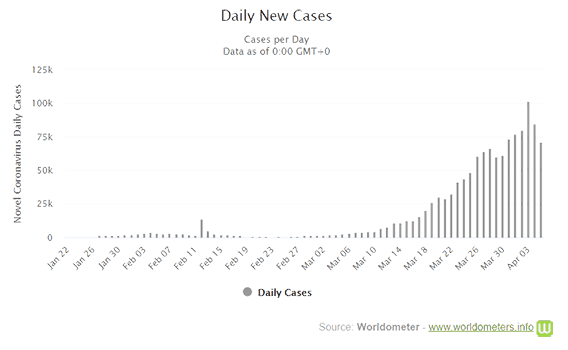
You’ve all been reading dozens of articles about the future of vacation rentals, the impact of COVID19 on the Short Term Rental industry, best practices during the crisis, how to disinfect your home between stays, and so much more.
If you feel that most of the articles you’ve read have a pessimistic touch to them, you’re not alone. Probably 80% of whatever I’ve read in the past few weeks draws a pretty grim picture. But are they right? Could it be possible that the future is not as dark as everyone thinks? Could the vacation rental industry rebound faster and stronger than what most experts tell us?
Whatever the actual outcome, it’s good to hear something optimistic now and then. Some of us want to, and many of us NEED to. This is why I scoured the interwebs to find all the good news I could about our industry and gathered them all in one place: here!
Airbnb is returning $250M to hosts

After the notable backlash from its extenuating circumstances policy, Airbnb is returning 25% of all force-waived cancellation fees to hosts. In his address to hosts, Brian Chesky also explained why the industry will recover faster than most people think. He also announced a $10M support fund for superhosts, and initiatives to secure support from governments all over the world for hosts that have been impacted. “Airbnb was born during a global crisis,” Chesky wrote, referring to the 2008 financial crisis. “It didn’t stop us then, and it won’t stop us now.” You can read more about Airbnb initiatives here.
Airbnb may be better equipped to survive the crisis than hotels
In this article by Troy Wolverton on Business Insider, Troy makes the case that because Airbnb is an agile tech company it has a much better chance of not only surviving this but coming out even stronger. Airbnb has a proven business model, dominates its portion of the market, and, unlike the hotel chains with which it competes, is able to adapt quickly to changing demand. The short-term rental service has been hit hard by the epidemic, just like the rest of the travel industry. But assuming it survives the pandemic-sparked downturn, that people eventually return to the travel habits they had pre-crisis, and that it’s able to largely hold on to its property-manager partners — none of which is a sure thing — Airbnb could end up in a better competitive position than it was in before anyone had heard of COVID-19.
The $2 Trillion US stimulus package may help the STR industry recover faster
Property management companies in the short-term rental sector are hopeful that the stimulus package will provide enough relief to enable partners to hang on until business normalizes. Industry CEOs believe that if this package can be accessed quickly enough, and things get back to some semblance of normality within a few months, it could provide just the bridge needed to keep businesses open, people employed, and get everyone to the other side of this intact. Others are hopeful that it could be meaningful, but that industry professionals should not rely on the promise of relief to make the necessary decisions of the day.
Many travel industry pros are still optimistic about the future
In a LinkedIn post on April 5, 2020, Skift CEO Rafat Ali asked his followers: “If you were writing a letter/essay on April 5, 2025, about what happened to travel industry in these intervening five years, what would you write, the most hopeful/meaningful version?” Many industry professionals participated in the ensuing conversation, mostly with positive thoughts. Rafat himself said that “Mine would be about how radical localism became the way travel industry came back, people began to appreciate their rural areas around cities and local small businesses in tourism/hospitality thrived as a result.” This means a strong boost for vacation rentals in rural areas since hotels are mostly located in urban and heavily tourist areas. Another pro added: “I would note how remarkably similar the overall travel landscape looks in 2025 to the way it looked in April 2019, in spite of and through the perils of the past five years – and there were many perils, and painful ones. People still love to travel, to connect, to explore. Purveyors who give them the most enriching and cost-effective ways to do so, still do well – and thrive. The names of the companies that are leading travel look and feel different than the names of the leaders of five years ago. The services they offer, differ markedly from the travel services of the past. Many venerable brands and companies perished. But others rose to take their place. We learned many valuable lessons in the aftermath of 2020. But by 2025, most of them have been forgotten. Most important, technology and its ability to at once transform and immediate the experience of travel, continues to be a driving force from both a b2b and b2c perspective.”
New trends and opportunities are emerging
Rena Pacheco-Theard is the CEO of Boutiq, a Techstars-backed travel startup that is using machine learning to buy vacation rental homes that they own and operate under the Boutiq brand. In a recent open letter, she stated: “Even in a time of uncertainty, new trends and opportunities are emerging, and startup founders are carrying on with the business of building companies, as well as families. Over the next 12 months, companies that can show strong unit economics, counter-cyclical resiliency and resourcefulness will rise to the top.” She believes that in troubled economic times, these travel trends emerge:
- Substitution of “fly to” with “drive to” destinations.
- Preference for private residences, rather than hotels (plus reduced food expenditures by increasing the purchase of groceries to be cooked in kitchens that most hotels do not offer).
- Preference for more remote locations, rather than urban.
And if you can appreciate those observations, it may not surprise you that our revenue is actually up from this same time last year.
The curve is flattening, and in many cases has already peaked
 As data shows, the pandemic curve has flattened in many countries and has already reached its peak in many others. This suggests that we might have seen the worse of it, and it can only get better from now on. If this is actually the case (and yes, this is a big IF), we might be looking at a rebound of travel as early as June. It will obviously consist primarily of domestic travel, but there might be a boost by people that would otherwise travel internationally, thus keeping occupancy rates not far from where they would be had COVID-19 not happened at all – especially for non-urban vacation rentals.
As data shows, the pandemic curve has flattened in many countries and has already reached its peak in many others. This suggests that we might have seen the worse of it, and it can only get better from now on. If this is actually the case (and yes, this is a big IF), we might be looking at a rebound of travel as early as June. It will obviously consist primarily of domestic travel, but there might be a boost by people that would otherwise travel internationally, thus keeping occupancy rates not far from where they would be had COVID-19 not happened at all – especially for non-urban vacation rentals.
Hosts that list on multiple channels will have a better chance of survival
Rentals United, one of the leading vacation rental channel managers and a Hosthub rival, believes that travel will come back quickly and most likely faster than anyone expects. Travel and tourism is a highly resilient industry that has recovered time and time again from diseases and natural disasters. In one of their latest blog posts, they point out several trends that will emerge out of this crisis, most notable of which is that property owners and managers will advertise on a much wider range of OTAs to compensate for lost revenues. Listing on multiple channels allows hosts to advertise their properties on a much wider audience and helps them increase their occupancy much faster. Additionally, building your own website and allowing direct bookings will also be an essential tool to help managers come out of this even stronger.
In many countries, hotels have shut down but Short Term Rentals are still open
The reason for this is that Short Term Rentals are essential lodging for a vast majority of people: Medical professionals, people looking for temporary shelters to quarantine themselves after a trip or after getting in close contact with a known carrier, government officials that travel around their country to coordinate government measures and attend to essential business, people with no other place to stay. Shutting down short term rentals would essentially be like shutting down long term rentals – ie not feasible. This provides some limited but essential income to hosts that will be able to survive the next few months and be around for the rebound when it happens.
Do you know any other good news? Have you recently read or heard something that sounds positive and optimistic? Please tell us on our Facebook page!

